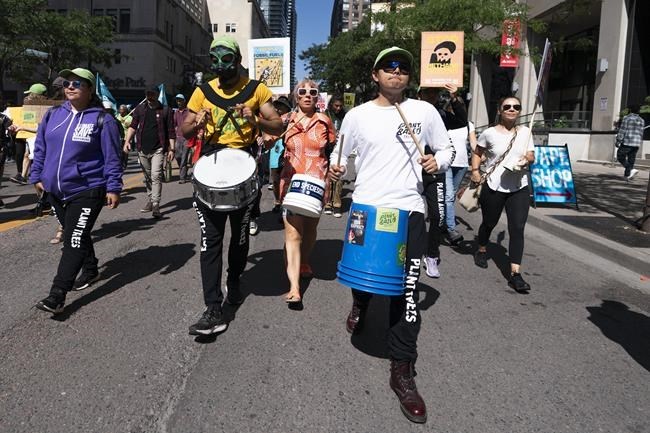TORONTO — Seven young people took the next step in their landmark challenge of Ontario's climate change plan on Monday, arguing before the province's highest court that the government's weakened emissions target was a violation of their rights.
A lawyer for the group told the court Monday that the young people, aged 16 to 28, come from different parts of the province and diverse backgrounds.
"But what unites them is they, like young people across this province and country and the planet, have come to recognize that government action on climate change is sorely missing the mark," Nader Hasan told the three-justice panel of the Court of Appeal for Ontario.
"Though some of our clients are too young still to affect change in the ballot box, they are constitutional rights holders in this country."
The appeal is part of a number of recent youth-led cases across Canada and other parts of the world where young people argue government climate inaction in the face of increasingly dire circumstances, from wildfire to floods, is a violation of their rights.
An Ontario trial judge in April dismissed the group's constitutional challenge, but her decision agreed that the gap between how much emissions need to be cut globally and what the provincial plan calls for is "large, unexplained and without any apparent scientific basis."
The group is now asking the appeal court to step in. They also want the court to order Ontario to develop a new "science-based target" consistent with its share of greenhouse gas emissions, a lawyer for the group told the appeal panel.
Lawyers for the government argued Monday such an order was beyond the court's jurisdiction and capacity.
The case dates back to when the then-newly elected Progressive Conservative government in 2018 repealed the law underpinning Ontario's cap-and-trade system for reducing emissions. The government scrapped the system and replaced the emissions target in that law – 37 per cent below 1990 levels by 2030 – with a new target of 30 per cent below 2005 levels.
The seven young people, backed by the environmental law charity Ecojustice, brought expert evidence indicating the new target would allow for an additional 200 million tonnes of emissions. They alleged the target commits Ontario to dangerously high levels of greenhouse gas emissions, amounting to a violation of their Charters rights to life and equality as young people, who will have to bear the brunt of climate impacts.
"The voices of youth must matter in Canadian law, including our hopes and sights for the future," said Beze Gray, from the Aamjiwnaang First Nation, one of the seven people bringing the case.
"For youth, our futures depend on action today," Gray said in a written statement ahead of Monday's appeal hearing.
Lawyers for the government argue in written filings that there is no constitutional duty to take positive steps to redress future harms of climate change. The government also says the trial judge was correct to find the adverse effects of climate change were not a violation of the equality rights of young people, since impacts will be felt by all age groups in the future.
While the constitutional challenge was unsuccessful at trial, the group says the case is still historic. The decision was the first in Ontario to find a court could hear a Charter-based challenge of a specific climate target or plan.
That decision was then cited by a Federal Court of Appeal ruling last month that reopened the door for 15 young people to bring a constitutional challenge against the Canadian government over its response to climate change.
The cases are two prominent Canadian examples of youth-led climate cases going before judges around the world.
In August, a Montana judge said state agencies had violated the constitutional rights to a clean and healthful environment of young people who brought a lawsuit. In September, six young people in Portugal brought a case accusing 32 European governments of violating their human rights for what they argue is a failure to adequately address climate change.
This report by The Canadian Press was first published Jan. 15, 2024.
Jordan Omstead, The Canadian Press



